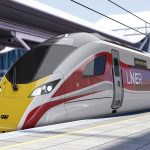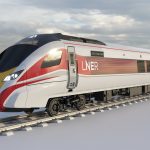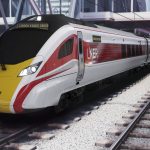 London North Eastern Railway (LNER) selected CAF as the preferred bidder to deliver a fleet of 10 ten-car new tri-mode trains which can operate in electric, diesel or battery mode.
London North Eastern Railway (LNER) selected CAF as the preferred bidder to deliver a fleet of 10 ten-car new tri-mode trains which can operate in electric, diesel or battery mode.
The contract also includes the maintenance services for the new trains for 8 years. The value of this operation exceeds EUR 500 million, this amount includes both the cost of purchase for the trains by Porterbrook who subsequently lease to LNER and maintenance delivered by CAF.
The tri-mode trains are based on the Civity UK platform, designed for intercity services which are fitted out with state-of-the-art safety technology. The trains also meet the most stringent requirements in terms of interior design and customer comfort.
The new trains will be assembled at the CAF manufacturing facility in Newport, Wales which has been operative since September 2018. Currently the facility employs a workforce of approximately 220 skilled staff and supporting personnel who are trained and prepared for the manufacture of all types of passenger railway vehicles. This includes from assembly to final acceptance and undertaking all factory and static type tests required before commissioning for service.
The new units will complement the modern Azuma fleet of 65 trains. This new fleet of trains will keep LNER on track to reduce its emissions by 67 per cent by 2035 and be net zero by 2045. LNER has already reduced carbon emissions by 50 per cent compared with 2018/19. Per mile, LNER trains produce 15 times less carbon emissions than a domestic flight.
“Successfully delivering this new fleet is an integral part of LNER’s Business Plan. Our focus is ensuring we create a fleet that truly matches the needs of all our customers, with clear targets on setting new standards for comfort, accessibility, and exceptional customer service,” David Horne, Managing Director at LNER, said.
The new fleet will enter passenger service on the LNER the East Coast Main Line (ECML) and is able to operate on both electrified and non-electrified sections of the network, increasing service operation efficiency and flexibility, as well as achieving a more sustainable and environmentally friendly transport system.
Share on:






